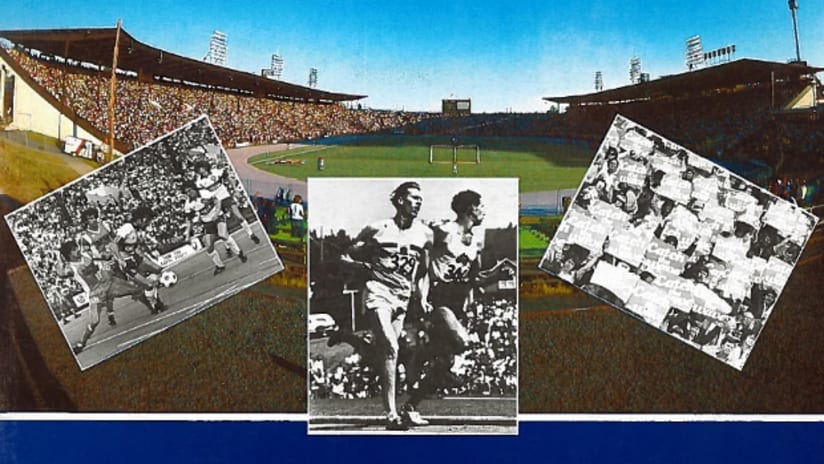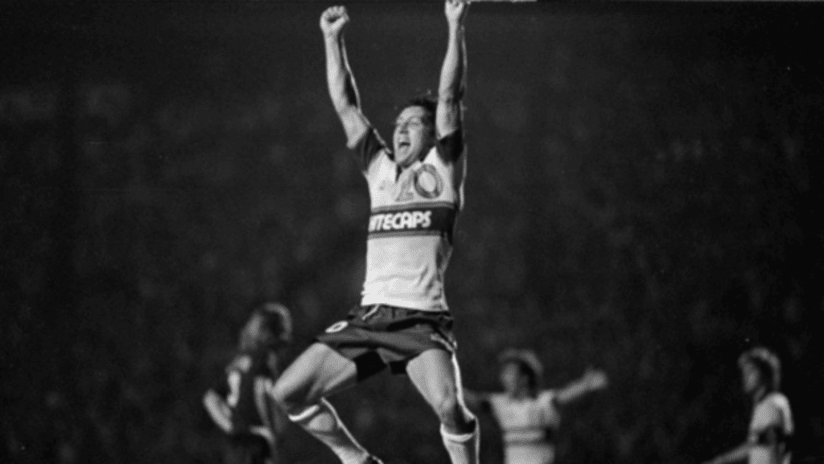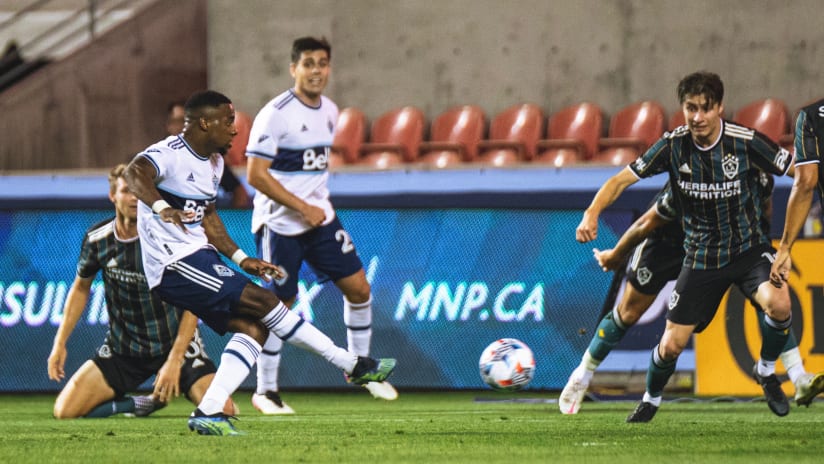We've gone digging through the archives again as we prepare to say a final farewell to Empire Field on Saturday. It's another story from the original 1983 "Farewell to Empire Stadium" edition of Whitecaps Magazine. This time, hall of fame sportswriter Jeff Cross from The Province dives into the history of soccer at the Empire grounds. Take it away Jeff.
Will it rain on the Whitecaps tonight?
If it does it’ll be a shame – but perfectly in keeping with soccer’s experience of Vancouver weather since old Empire Stadium first played host to the game almost exactly 27 years ago.
It rained – boy, did it rain – when England’s Everton and Scotland’s Aberdeen sloshed onto the Empire Stadium turf (REAL turf) on Monday, June 11, 1956 – to play in what soccer organizers billed for months as “the dream game”.
Previously, touring teams from Britain and elsewhere had come here singly, to show their stuff against the best that B.C. could muster. They played their games at Old Callister Park, right across from the Pacific Coliseum and packed the cosy, ramshackled old stadium to its splintering rafters.
Vancouver was always the high spot of the visitors’ cross-country tour. They knew they’d get a game here – as for instance in 1953 when the locals defeated Northern Ireland 3-2 – and this was the place where the tour would make the dollars that turned the organizers’ loss into profit.
The idea for “the dream game” has been hatching for several years. The Canadian Soccer Association brought over an overseas team each summer. The U.S. Soccer Federation did the same thing south of the border. Occasionally the two touring teams met – but never in Vancouver. There was no facility to make it financially viable. You could pack 5,000 or more into Callister, but that was nowhere near enough to meet expenses.
Then came Empire Stadium in 1954 and the “dream game” concept became reality.
Aberdeen and Everton started it off. An interesting choice. Both were experienced First Division clubs and the English Scottish rivalry would add a piquancy to the event.
Aberdeen started its cross-Canada tour on the right note, knocking off the Quebec all-stars 8-0 before 6,017 in Montreal, Manitoba all-stars 5-0 before 2,500 in Winnipeg, then Saskatchewan all-stars 17-0 before 2,652 at Taylor Field, Regina.
In Vancouver everything was ready. Advance ticket sales had topped 13,000 and officials were confident the game would draw “around 25,000 fans” – setting a new Canadian soccer record (the record at the time was 24,827 at Toronto’s Varsity Stadium in 1953 for a Tottenham-Manchester City game).
But of course it rained. Actually it didn’t just rain, it came down in a torrent. Any ordinary game would have been called off.
But this was not ordinary. This was what soccer fans here had dreamed about for years. And despite the downpour, 18,363 fans paid their way to watch a hard-fought, skillfully-played 3-3 tie.
As my old friend and predecessor at The Vancouver Province, Austin Delany, wrote the next day:
“It was without doubt the finest soccer game ever played here … the heavy rain, which never once got out of high gear, made not a particle of difference to either team. They loved it …”
Sports Editor Alf Cottrell, who also knew his way around a soccer field, added his own comment:
“It rained steadily. Water from wayward umbrellas spouted down necks. So, on the sort of Saturday night you wouldn’t put your mother-in-law out, the Aberdeen-Averton game drew 18,363. Conclusion: soccer must have some sort of future here.”
Patrolling the right wing for Aberdeen that day was 21-year-old speedster named Graham Leggat who earned a lot of praise for his performance. He was the same Graham Leggat who was later to return to Canada as coach, manager, businessman and television commentator.
It was due at least in part to Leggat that Aberdeen stayed on in town for a couple of days longer than scheduled – and played a hastily-arranged game on the Monday night against B.C. all-stars. This was no 17-0 affair. It wound up 2-2 with Art Hughes and Joe Johnson scoring for the locals – and 6,561 fans jammed into Callister Park to watch.
Mostly because of that result and a couple of subsequent score like it, the first-ever Canadian team to compete in the World Cup (in 1957) was drawn entirely from B.C.
But back to Empire Stadium.
Locals hoped to play in the new facility the previous summer (1955) when England’s Huddersfield was the visitor, but the Stadium turf was being re-sodded at the time and the proposed game went instead to Winnipeg.
In subsequent years following that 1956 success, the annual “dream game” became a fixture on the B.C. sports calendar. Many of the world’s great teams played here, before crowds often over 20,000.
And the visitors loved Empire Stadium.
Tottenham Hotspur manager Jimmy Anderson said in ’57: “It’s the best pitch I’ve seen outside of Wembley. If we could take it home with us and play on it every week, we’d win the League and Cup every year.”
Others, like the great Alfredo di Stefano, who played here with Real Madrid in 1961, loved the atmosphere at Empire Stadium. So did his Madrid side-kick, Hungary’s Galloping Mayor, Ferenc Puskas, who later returned to coach the ill-fated Vancouver Royals.
The fabled Madrid team pulled in over 24,000 fans for a Friday night game here – and it didn’t rain.
The memory is hazy concerning weather conditions for the Empire Stadium debut of the old Vancouver Royals in 1968 (a 4-1 win over Toronto before 5,620 fans) but I well remember the second game against Baltimore three days later, when it did everything but snow, and 3,123 fans sat huddled in the stands.
The Whitecaps naturally made their North American Soccer League debut in the rain.
That was May 5, 1974, when the San Jose Earthquakes registered a 2-1 win (on penalty kicks). But that was merely a steady rain, not one of your Empire Stadium cold bursts. The crowd of 17, 343 barely noticed. And on the dry nights, the crowds grew and grew – with many capacity crowds noted in the ‘Caps statistical notebook.
There have been many, many other wet ones. In 1975 it poured for the first three home games, as attendance dropped from 10,000 to 7,000; it rained for the home-openers in 1976 and 1977; and who can forget that game against Manchester United in 1976, which drew over 16,000 for a game which more resembled water polo and ended, inevitably, in a 0-0 tie, with players throwing up rooster-tails of water each time they made a tackle.
So it would be fitting – and entirely forgivable – if it rained tonight. Maybe not of your ‘Force Eight’ downpours. There’s still an important game to be played. But if it sprinkles just a little, maybe for a few moments at the start of the game, nostalgia will be satisfied.
And it will be something to look back on, in the years to come, as we sit back in the comfort of our posh new stadium – wondering what the weather’s like outside.
Don't miss out on the final farewell to Empire Field this Saturday, September 24, as Vancouver Whitecaps FC battle Pacific Northwest rivals Seattle Sounders FC. Kickoff is set for 7:30 p.m. PT. Individual match tickets start at $20, plus applicable service charges, and are available at all Ticketmaster Ticket Centres, online at ticketmaster.ca, and Charge-by-Phone at 1.855.6.GO-CAPS (1.855.646.2277). Visit whitecapsfc.com/tickets for more information on individual match tickets for the club's inaugural MLS season.





